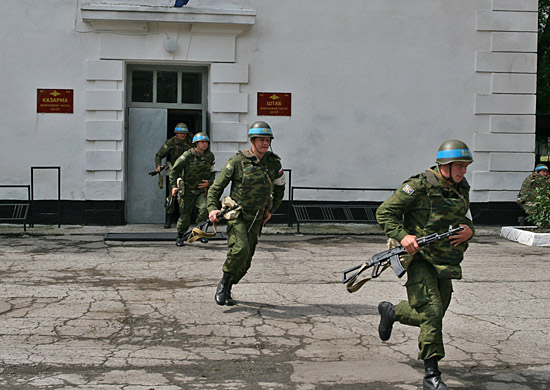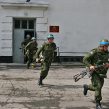
Moldova, Ukraine Bar Russian Military Flights and Arms Transit to Tiraspol
Publication: Eurasia Daily Monitor Volume: 10 Issue: 145
By:

On July 29, the Russian defense ministry’s Zvezda Television announced that new helicopters would “soon” be delivered to Russian “peacekeeping” troops in Moldova’s Transnistria territory. It claimed that the matter “is being agreed upon” with Moldova, following the green light already received from Tiraspol (Zvezda TV, July 29). Moldova’s Defense Minister Vitalie Marinuta and Foreign Affairs Minister Natalia Gherman refuted this assertion (Infotag, Jully 29; RFE/RL, July 30; Moldovan Public TV Channel One, July 31; Kommersant-Moldova, August 1).
Moscow seeks to achieve two objectives in one stroke: to modernize the equipment of its troops on Moldova’s territory, and to re-open the Tiraspol military airport for delivering some of the new equipment. Those “peacekeeper” troops’ existing equipment is antiquated, although in ample surplus.
Russia’s Ministry of Defense and Deputy Prime Minister Dmitry Rogozin had announced these inter-related goals in April 2012, as Vladimir Putin was returning to the presidency and Rogozin was taking up his parallel assignment as the president’s special representative “for Transnistria.” The defense ministry and Rogozin announced intentions to deliver modern military vehicles, sniper rifles and helicopters, as well as to modernize Tiraspol’s disused military airport. Then-Defense Minister Anatoly Serdyukov conducted a needs-assessment visit to Russia’s “peacekeeping” troops together with Colonel-General Valery Yevnevich, former commander of Russia’s “peacekeepers” in Moldova, currently supervising all of Russia’s peacekeeping forces. They did not inform Chisinau about the visit (let alone request permission), drawing diplomatic protests from Moldova (see EDM, April 20, 2012; July 27, 31, 2012).
Since then, Ukraine has worked with Moldova to bar the transit of Russian military equipment to eastern Moldova (Transnistria) via Ukraine, whether by air or overland. Under international law, Russia may not bring military equipment to Moldova’s territory without Chisinau’s consent. Chisinau does not consent. Kyiv takes the position that it cannot allow such transit through Ukraine’s territory, as long as Chisinau does not authorize the entry of such cargo to Moldova’s territory.
Kyiv has acted unobtrusively to avoid a public row with Moscow on this issue. Kyiv takes the position that it complies with Chisinau’s position in deference to international law. Ukraine has handled the situation at the mid-level official and bureaucratic level, rather than the political level.
Ukraine’s State Service of Export Control informed Russia’s Defense Ministry in February 2013 in an explanatory note that Ukraine could not allow such transit without Moldova’s consent. When Moscow complained, the Ukrainian Foreign Affairs Ministry spokesman referenced that note, stating that any transit of Russian military cargo via Ukraine en route to Moldova’s territory would have to be agreed upon with Moldova first (Interfax-Ukraine, May 27). On July 31, reacting to Zvezda TV’s announcement about the helicopters’ impending delivery, Ukrainian senior diplomat Andriy Deshchitsyya stated that Kyiv would only open the borders for such deliveries provided that Moscow and Chisinau agree among themselves. Deshchitsyya currently serves as special envoy on the protracted conflicts for the Ukrainian chairmanship of the Organization for Security and Cooperation in Europe (OSCE) (Nezavisimaya Gazeta, July 31).
Russia’s “peacekeeping” contingent had operated a squadron of Soviet-era helicopters from 1992 until 1998. In that year, the squadron was de-activated, some of its helicopters being shipped to Russia while others were mothballed in Transnistria.
In the autumn of 2012, Russia proposed to evacuate those old helicopters by cargo plane from Tiraspol airport, and bring instead new helicopters—either by air again, or by surface transport, or by flying them across Ukraine with refueling stops. The Russians conducted at least one test landing at Tiraspol airport. The helicopters’ evacuation by cargo plane would have served as an excuse to re-open the Tiraspol airport, preparatory to reconstruction work. Bringing in new helicopters irrespective of transportation method would have been a step toward re-militarization, instead of de-militarization of the “peacekeeping” operation and of the territory itself. Chisinau refused permission, and Kyiv followed suit.
After that, Russia has avoided raising this issue with Chisinau. Prior to Zvezda TV’s trial balloon, Russia’s Defense Minister Sergei Shoigu had twice seen his Moldovan counterpart, Marinuta, during international conferences in Moscow and Minsk, in May and June, respectively. On July 24, Russia’s Foreign Affairs Minister Sergei Lavrov received his Moldovan counterpart, Gherman, in Moscow on a working visit. Moscow’s intention to re-equip its troops in Moldova had become a festering issue at that point; but, according to Moldovan officials, neither Shoigu nor Lavrov raised that issue. Conversely, Marinuta and Gherman reminded their Russian counterparts that Moldova seeks de-militarization of Transnistria, opposing any additional delivery of military equipment there (Moldpres, May 24, July 27; Kommersant-Moldova, August 1).
Shoigu did, however, raise the issue of re-activating the Tiraspol military airport during his informal meeting with Marinuta in Moscow in May. Also at that point, General Yevnevich (see above) complained during a debate in Russia’s Duma that Ukraine and Moldova were jointly refusing permission for Russian military planes to overfly their territories and land at Tiraspol airport. Yevnevich accused Chisinau and Kyiv of staging a “blockading” of that airport and, thus, Russia’s “peacekeepers.” Tiraspol’s Soviet-era airport has not been used for at least a decade. Russia’s defense ministry proposes to rebuild, modernize and use it (Interfax, Kommersant Moldovy, May 22, 24).
Transnistria’s local authorities also seek to have that airport modernized and re-opened. Transnistria’s “president,” Yevgeny Shevchuk, has announced a search for financial sponsors in Russia for such a project; and the Transnistria side is raising that issue in the framework of the international 5+2 negotiations. At the latest 5+2 session, held in Vienna on July 17–18, the Transnistria side cited Armenia’s opening of the Stepanakert airport in Karabakh, with the assistance of Russian experts (see EDM, October 11, 2012), as a possible model for reactivating the Tiraspol airport.
Chisinau, with Kyiv’s support, takes the position that any reconstruction and use of Tiraspol airport can only be done within the framework of Moldova’s sovereignty, its undivided control of air safety and border protection, and under the International Civil Aviation Organization’s (ICAO) binding rules.
Kyiv and Chisinau allow Russia’s “peacekeeping” troops to be continuously resupplied by surface transportation with non-military goods. In that sense the Russian troops are not being subjected to a “blockade.”
Russia recognizes Moldova’s territorial integrity on paper, but is breaching it in practice through the stationing of its troops and its more recent intentions to re-equip them. For its part, Ukraine recognizes Moldova’s territorial integrity also in practice by declining to cooperate with Russia’s breach.




